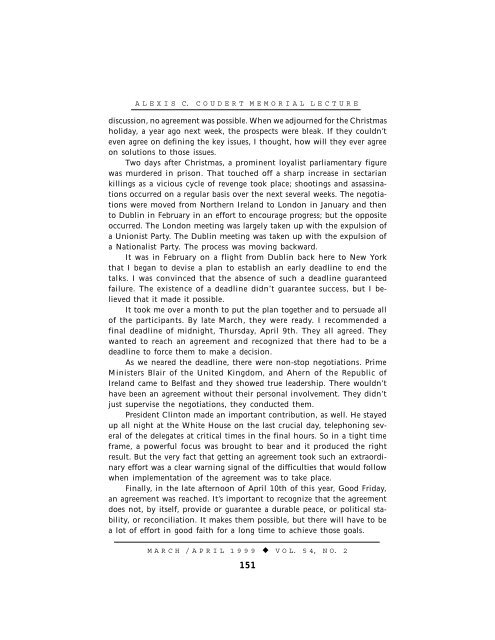THE RECORD - New York City Bar Association
THE RECORD - New York City Bar Association
THE RECORD - New York City Bar Association
Create successful ePaper yourself
Turn your PDF publications into a flip-book with our unique Google optimized e-Paper software.
A L E X I S C. C O U D E R T M E M O R I A L L E C T U R E<br />
discussion, no agreement was possible. When we adjourned for the Christmas<br />
holiday, a year ago next week, the prospects were bleak. If they couldn’t<br />
even agree on defining the key issues, I thought, how will they ever agree<br />
on solutions to those issues.<br />
Two days after Christmas, a prominent loyalist parliamentary figure<br />
was murdered in prison. That touched off a sharp increase in sectarian<br />
killings as a vicious cycle of revenge took place; shootings and assassinations<br />
occurred on a regular basis over the next several weeks. The negotiations<br />
were moved from Northern Ireland to London in January and then<br />
to Dublin in February in an effort to encourage progress; but the opposite<br />
occurred. The London meeting was largely taken up with the expulsion of<br />
a Unionist Party. The Dublin meeting was taken up with the expulsion of<br />
a Nationalist Party. The process was moving backward.<br />
It was in February on a flight from Dublin back here to <strong>New</strong> <strong>York</strong><br />
that I began to devise a plan to establish an early deadline to end the<br />
talks. I was convinced that the absence of such a deadline guaranteed<br />
failure. The existence of a deadline didn’t guarantee success, but I believed<br />
that it made it possible.<br />
It took me over a month to put the plan together and to persuade all<br />
of the participants. By late March, they were ready. I recommended a<br />
final deadline of midnight, Thursday, April 9th. They all agreed. They<br />
wanted to reach an agreement and recognized that there had to be a<br />
deadline to force them to make a decision.<br />
As we neared the deadline, there were non-stop negotiations. Prime<br />
Ministers Blair of the United Kingdom, and Ahern of the Republic of<br />
Ireland came to Belfast and they showed true leadership. There wouldn’t<br />
have been an agreement without their personal involvement. They didn’t<br />
just supervise the negotiations, they conducted them.<br />
President Clinton made an important contribution, as well. He stayed<br />
up all night at the White House on the last crucial day, telephoning several<br />
of the delegates at critical times in the final hours. So in a tight time<br />
frame, a powerful focus was brought to bear and it produced the right<br />
result. But the very fact that getting an agreement took such an extraordinary<br />
effort was a clear warning signal of the difficulties that would follow<br />
when implementation of the agreement was to take place.<br />
Finally, in the late afternoon of April 10th of this year, Good Friday,<br />
an agreement was reached. It’s important to recognize that the agreement<br />
does not, by itself, provide or guarantee a durable peace, or political stability,<br />
or reconciliation. It makes them possible, but there will have to be<br />
a lot of effort in good faith for a long time to achieve those goals.<br />
M A R C H / A P R I L 1 9 9 9 ◆ V O L. 5 4, N O. 2<br />
151

















